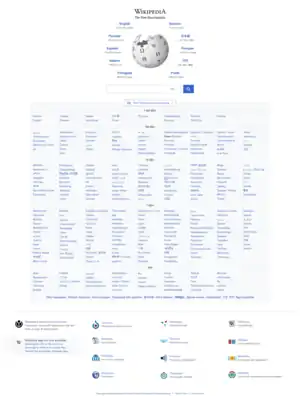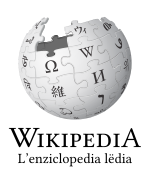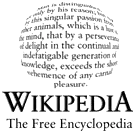List of Wikipedias
Wikipedia is a free multilingual wiki-based online encyclopedia edited and maintained by a community of volunteer editors, started on January 15, 2001 as an English-language encyclopedia. Soon, non-English editions were created: the German and Catalan editions were created on circa 16 March,[1] the French edition was created on 23 March,[2] and the Swedish edition was created on 23 May.[3] As of February 2021, Wikipedia articles have been created in 317 editions, with 306 currently active and 11 closed.[4]

The Meta-Wiki language committee, consisting of 16 members, is in charge of managing the policies on creating a new Wikimedia project edition, processing requests, as well as "supporting and coordinating new projects to optimize their success." In order to pass eligibility, a language must have a valid ISO 639 code, be "sufficiently unique," and have a "sufficient number of fluent users to form a viable contributor community and an audience for the content." In order to pass eligibility for closure, an edition should either "don't have content or existing content", or possibly "controversial, questionable or in another way uncommon."[5]
Wikipedia edition codes
Each Wikipedia has a code, which is used as a subdomain below wikipedia.org. Interlanguage links are sorted by that code. The codes represent the language codes defined by ISO 639-1 and ISO 639-3, and the decision of which language code to use is usually determined by the IETF language tag policy. Wikipedias also vary by how thinly they slice dialects and variants; for example, the English Wikipedia includes most modern varieties of English (American, British, Indian, South African, etc.), but does not include other related languages such as Scots or Old English/Anglo-Saxon, both of which have separate Wikipedias. The Spanish Wikipedia includes both Peninsular Castilian and Latin American Spanish; Malay Wikipedia includes a large number of Malay languages; and so on.
Differences between the ISO mappings and Wikipedia codes include:
| WP code | WP edition | ISO 639 | Notes | Ref. |
|---|---|---|---|---|
| sq | Albanian | multiple | 'sq' is the ISO code for the Albanian macrolanguage, which includes four individual languages. | [7][8][9] |
| als | Alemannic | gsw | 'als' is the ISO code for Tosk Albanian. Alemannic Wikipedia covers several dialects: 'gsw' for Swiss German, Alemannic German, and Alsatian; 'gct' for Colonia Tovar dialect; 'swg' for Swabian German, and 'wae' for Walser German | |
| roa-rup | Aromanian | rup | 'roa' is the ISO code for Romance (Other). | |
| map-bms | Banyumasan | none | 'map' is the ISO code for Austronesian (Other). | |
| nds-nl | Dutch Low Saxon | multiple | In ISO, nds is 'Low Saxon', restricted to Germany in Ethnologue. The various subdivisions of Dutch Low Saxon have separate ISO codes. | |
| bh | Bihari | bih | ISO code 'bih' is a macrolanguage which includes Bhojpuri (bho), Maithili (mai), Magahi (mag), and nine others. Bihari Wikipedia excludes Maithili (mai) and Fiji Hindi (hif) which exist as independent Wikipedias. | |
| zh-yue | Cantonese | yue | zh is the ISO 639-1 code for Chinese in general. | |
| zh-classical | Classical Chinese | lzh | As above. | |
| ms | Malay | ms | ISO collective code 'ms' is a macrolanguage that includes more than 30 individual languages and dialects. However, the wiki excludes Indonesian because Indonesian Wikipedia (id) exists independently. | |
| zh-min-nan | Southern Min/Min Nan | nan | Same as the "zh" languages. Not written in Chinese characters, but uses Pe̍h-ōe-jī or a derived romanization. hak does the same. | |
| no | Norwegian (Bokmål) | nb, nob | ISO uses no for Norwegian in general. (Norwegian Nynorsk is at 'nn' in both ISO and Wikipedia.) | |
| ksh | Ripuarian | none | ISO ksh is for the Colognian dialect, the most prominent dialect of the Ripuarian language group. The other variants (e.g. the Aachen dialect) do not have ISO codes. | |
| bat-smg | Samogitian | sgs | 'bat' is the ISO code for Baltic (Other). | |
| simple | Simple English | none | ||
| roa-tara | Tarantino | none | 'roa' is the ISO code for Romance (Other). Neapolitan in general is nap. | |
| fiu-vro | Võro | vro | fiu is the ISO code for Finno-Ugric languages. | |
| cbk-zam | Zamboanga Chavacano | none | ISO cbk is for the Chavacano language. The individual variants do not have ISO codes. |
Additionally, Wikipedias vary in orthography at times. Chinese Wikipedia automatically translates from modern Mandarin Chinese into five standard forms: Mainland China and Singapore in simplified Chinese characters, and Taiwan, Hong Kong, and Macau in traditional Chinese characters. Belarusian, however, has a separate Wikipedia for English.
List
The table below lists the language editions of Wikipedia roughly sorted by the number of active users (registered users who have made at least one edit in the last thirty days); in particular, the "power of ten" of the count of active users (i.e., the common logarithm rounded down to a whole number) is used: so "5" means at least 105 (or 100,000), "4" means at least 104 (10,000), and so on.[4] Script names are listed as their ISO codes.
Note that not all Wikipedias are of a language: the Nostalgia Wikipedia is an archive of the English Wikipedia's initial display, whilst the Simple English Wikipedia merely uses Basic English.
Detailed list
Notes
- The "Total" column refers to the number of pages in all namespaces, including both articles (the official article count of each wiki) and non-articles (user pages, images, talk pages, "project" pages, categories, re-directs, and templates).
- "Active users" are registered users who have made at least one edit in the last thirty days.
- "Images" is the number of locally uploaded files. Note that some large Wikipedias don't use local images and rely on Commons completely, so the value 0 is not an error.
- The "Depth" column (Edits/Articles × Non-Articles/Articles × [1−Stub-ratio]) is a rough indicator of a Wikipedia's quality, showing how frequently its articles are updated. It does not refer to academic quality.
- Lsjbot, a bot run by Sverker Johansson, is responsible for much of the growth of the second and third largest Wikipedias, the Cebuano and Swedish Wikipedia, respectively, as well as the rapid growth of the Waray Wikipedia.
- The statistics are derived from API:Siteinfo and updated at Commons:Data:Wikipedia statistics/data.tab every six hours and displayed with
{{NUMBEROF}}and{{WP7}}.
Grand total
| Articles | Total | Edits | Admins | Users | Active users | Images |
|---|---|---|---|---|---|---|
| 55,774,091 | 228,857,220 | 2,915,317,419 | 3,898 | 94,115,009 | 358,937 | 2,646,880 |
Number of Wikipedias by language families and groups
- Indo-European languages — 131
- Altaic languages — 23
- Uralic languages — 15
- Finno-Permic languages — 14
- Ugric languages — 1
- Dravidian languages — 5
- Ibero-Caucasian languages — 10
- Sino-Tibetan languages — 12
- Afroasiatic languages — 12
- Semitic languages — 8
- Cushitic languages — 2
- Berber languages — 1
- Chadic languages — 1
- Austronesian languages — 31
- Austroasiatic languages — 4
- Kra–Dai languages — 4
- Indigenous languages of the Americas — 12
- Indigenous languages of North America — 6
- Indigenous languages of South America — 3
- Eskimo–Aleut languages — 3
- Niger–Congo languages — 28
- Atlantic languages — 4
- Mande languages — 2
- Benue–Congo languages — 20
- Bantu languages — 18
- Volta–Niger languages — 2
- Kwa languages — 1
- Savannas languages — 1
- Nilo-Saharan languages — 1
- Language isolate — 1
- Pidgins and creole languages — 10
- Constructed languages — 8
References
- Wales, Jimmy (16 March 2001). "Alternative language wikipedias". Wikipedia-L (Mailing list). Archived from the original on 20 June 2014. Retrieved 21 December 2020.
- Noisette, Thierry (24 September 2010). "Wikipédia en français dépasse le million d'articles" [French Wikipedia exceeds one million articles]. ZDNet France (in French). Red Ventures. Archived from the original on 7 November 2016. Retrieved 21 December 2020.
Wikipédia, l'encyclopédie collaborative libre, fêtera ses dix ans en janvier 2011, et a débuté le 23 mars 2001 en version française, mais dès ce jeudi 23 septembre, à neuf ans et demi exactement, la Wikipédia francophone a enregistré officiellement le cap du million d'articles.
- "History of HomePage". Swedish Wikipedia. Archived from the original on 8 October 2001. Retrieved 21 December 2020.
- List of Wikipedias. Meta-Wiki. Archived from the original on 20 December 2020. Retrieved 20 December 2020.
- Meta-Wiki pages:
- Language committee. Meta-Wiki. Archived from the original on 12 December 2020. Retrieved 22 December 2020.
- Language proposal policy. Meta-Wiki. Archived from the original on 11 November 2020. Retrieved 22 December 2020.
- Closing projects policy. Meta-Wiki. Archived from the original on 13 August 2020. Retrieved 22 December 2020.
- "Wikipedia Statistics - Bot article creations only". Wikimedia Stats. Archived from the original on 4 July 2014. Retrieved 3 July 2019.
- "ISO 639-3 Macrolanguage Mappings". SIL International. Archived from the original on 11 October 2020. Retrieved 22 December 2020.
- "ISO 639 code tables". SIL International. Archived from the original on 8 July 2006. Retrieved 9 March 2018.
- "Browse by Language Family". Ethnologue. Archived from the original on 14 October 2012. Retrieved 9 March 2018.
External links
- Wikipedia portal
 Media related to Wikipedia at Wikimedia Commons
Media related to Wikipedia at Wikimedia Commons Wikipedia at Wikinews
Wikipedia at Wikinews Learning materials related to Wikipedia at Wikiversity
Learning materials related to Wikipedia at Wikiversity Works related to Wikipedia press releases at Wikisource
Works related to Wikipedia press releases at Wikisource














































































































































































































































































































